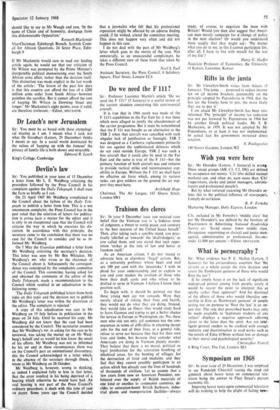• Devlin's law
Sir: You published in your issue of 15 December a letter from Mr L. E. Weidberg criticising the procedure- followed by the Press Council in his complaint against the Daily Telegraph. I shall state the facts as briefly as I can.
On 23 April 1967 Mr Weidberg complained to the Council about the failure of the Daily Tele- graph to publish a letter from him. This is a not uncommon complaint; the Press Council has in the past ruled that the selection of letters for publica- tion is prima lack a matter for the editor and it is only in an exceptional case that the Council will criticise the way in which he exercises his dis- cretion. In accordance with this principle, the secretary came to the conclusion that there was no case for the Council to consider and he so in- formed Mr. Weidberg.
On 5 May the Guardian published a letter from Mr Weidberg criticising the secretary's decision. This letter was seen by Mr .Ben Whitaker, Mr Weidberg's MP, who wrote to the chairman of the Council about it. Subsequently the correspon- dence was considered by the complaints committee of the Council. This committee, having asked for and obtained the comments of the editor of the Daily Telegraph. made a recommendation to the Council which resulted in an adjudication in the following terms: 'The Daily Telegraph published letters from both sides on this topic and the decision not to publish MT Weidberg's letter was within the discretion of the editor. The complaint is rejected.'
A copy of this adjudication was sent to Mr Weidberg on 19 July before its publication in the press on 24 July. Until he received his copy, Mr Weidberg did not know that the case had been considered by the Council. The secretariat assumed that Mr Weidberg's MP, in asking for the case to be reviewed, was taking the matter up on Mr Weid- berg's behalf and so would let him know the result of his efforts. Mr Weidberg was not so informed by his MP and in these circumstances there was on the Council's part an unintentional discourtesy; this the Council acknowledged in a letter which, in the absence of the secretary through illness, I wrote to Mr Weidberg on 26 October.
Mr Weidberg is. however, wrong in thinking, as indeed I explained fully to him in that letter, that the error resulted in his being deprived of hearing which otherwise be would have had. An oral hearing is not part of the Press Council's ordinary procedure; it deals with this type of case on paper. Some years' ago the Council decided that a journalist who felt that his professional reputation might be affected by in adverse finding could, if ho wished, attend the committee meeting. This does not happen very often and did not happen in this case.
I do not deal with the part of Mr Weidberg's letter which goes to the merits of the case. Not unnaturally, as an unsuccessful complainant, he takes a different view of these from that taken by the Press Council.
Noel S. Paul Assistant Secretary, the Press Council, 6 Salisbury Square, Fleet Street, London EC4






























 Previous page
Previous page